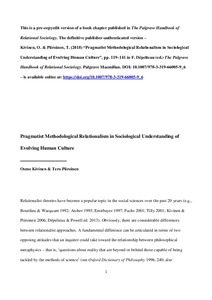| dc.contributor.author | Osmo Kivinen | |
| dc.contributor.author | Tero Piiroinen | |
| dc.date.accessioned | 2022-10-27T11:54:39Z | |
| dc.date.available | 2022-10-27T11:54:39Z | |
| dc.identifier.isbn | 978-3-319-66005-9 | |
| dc.identifier.uri | https://www.utupub.fi/handle/10024/155835 | |
| dc.description.abstract | <p>Among the most significant intellectual contributions made by the
classic of pragmatism John Dewey are his presentation of human culture
as evolving organism–environment transactions and the related
philosophies of community and education. Dewey’s philosophy and
methodology are relational all the way down, and without a doubt he can
be seen as an eminent pioneer of relational social science. However,
although relationalist social theorists today are to some extent drawing
on Dewey’s ideas, all too few contemporary social scientists seem aware
of Dewey’s role in paving the way for the Darwinian theory of evolution
in social sciences. This may partly be explained by the long-standing
mistrust of evolutionary theory among social scientists—due to the
notoriety of ‘Social Darwinism’, ‘sociobiology’, and any simplistic
version of ‘evolutionary psychology’. But unlike crude applications of
evolutionary theory, Dewey’s anti-nativist, anti-individualist
naturalism of Darwinian origin opens up interesting viewpoints on social
life, especially on cultural learning as a cornerstone of modern
humanity. In this chapter, methodological relationalism—as opposed to
ontological relationalism—brings forth evolution-historically
enlightened conceptual tools for social scientific work. The proposed
solution revolves in particular around the evolution-theoretically
topical notion of ‘niche construction’—a notion which Dewey’s thinking
already anticipated.</p> | |
| dc.language.iso | en | |
| dc.publisher | Palgrave Macmillan | |
| dc.title | Pragmatist methodological relationalism in sociological understanding of evolving human culture | |
| dc.identifier.urn | URN:NBN:fi-fe2021042719037 | |
| dc.contributor.organization | fi=PÄÄT RUSE|en=PÄÄT RUSE| | |
| dc.contributor.organization-code | 2609900 | |
| dc.converis.publication-id | 30837186 | |
| dc.converis.url | https://research.utu.fi/converis/portal/Publication/30837186 | |
| dc.format.pagerange | 119 | |
| dc.format.pagerange | 141 | |
| dc.okm.affiliatedauthor | Kivinen, Osmo | |
| dc.okm.affiliatedauthor | Piiroinen, Tero | |
| dc.okm.discipline | 5141 Sociology | en_GB |
| dc.okm.discipline | 5141 Sosiologia | fi_FI |
| dc.okm.internationalcopublication | not an international co-publication | |
| dc.okm.internationality | International publication | |
| dc.okm.type | Inbook | |
| dc.publisher.country | United States | en_GB |
| dc.publisher.country | Yhdysvallat (USA) | fi_FI |
| dc.publisher.country-code | US | |
| dc.publisher.isbn | 978-3-319; 978-0-230; 978-0-333; 978-1-137; 978-1-349; 978-1-4472; 978-1-78632; 978-0-312; 978-1-4039; 978-1-137; 978-981-13; 978-981-10; 978-3-030; 978-981-15; 978-981-16; 978-3-031 | |
| dc.relation.doi | 10.1007/978-3-319-66005-9_6 | |
| dc.title.book | The Palgrave Handbook of Relational Sociology | |
| dc.year.issued | 2018 | |
